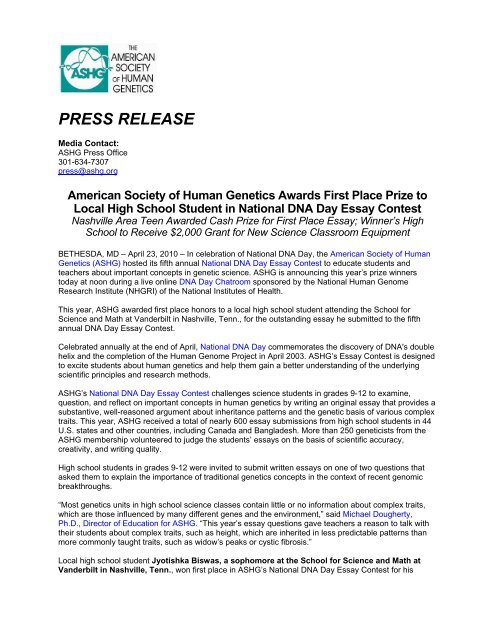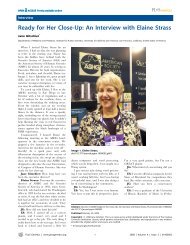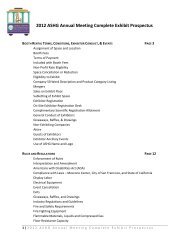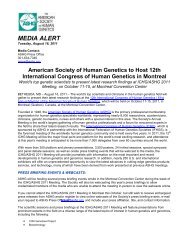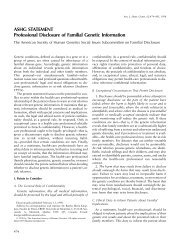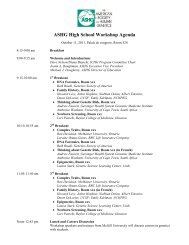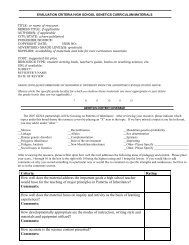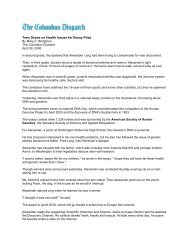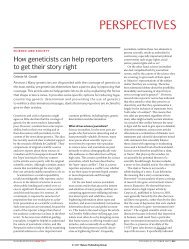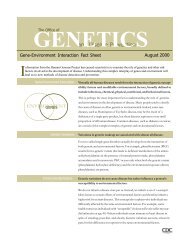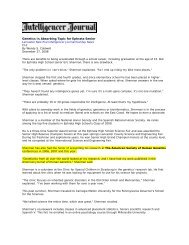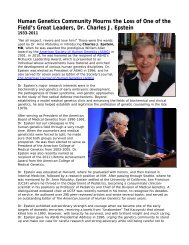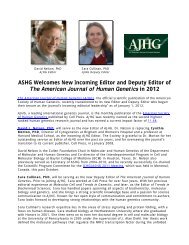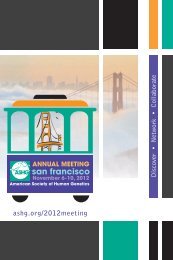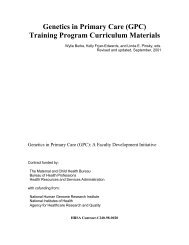Nashville, TN - American Society of Human Genetics
Nashville, TN - American Society of Human Genetics
Nashville, TN - American Society of Human Genetics
Create successful ePaper yourself
Turn your PDF publications into a flip-book with our unique Google optimized e-Paper software.
PRESS RELEASE<br />
Media Contact:<br />
ASHG Press Office<br />
301-634-7307<br />
press@ashg.org<br />
<strong>American</strong> <strong>Society</strong> <strong>of</strong> <strong>Human</strong> <strong>Genetics</strong> Awards First Place Prize to<br />
Local High School Student in National DNA Day Essay Contest<br />
<strong>Nashville</strong> Area Teen Awarded Cash Prize for First Place Essay; Winner’s High<br />
School to Receive $2,000 Grant for New Science Classroom Equipment<br />
BETHESDA, MD – April 23, 2010 – In celebration <strong>of</strong> National DNA Day, the <strong>American</strong> <strong>Society</strong> <strong>of</strong> <strong>Human</strong><br />
<strong>Genetics</strong> (ASHG) hosted its fifth annual National DNA Day Essay Contest to educate students and<br />
teachers about important concepts in genetic science. ASHG is announcing this year’s prize winners<br />
today at noon during a live online DNA Day Chatroom sponsored by the National <strong>Human</strong> Genome<br />
Research Institute (NHGRI) <strong>of</strong> the National Institutes <strong>of</strong> Health.<br />
This year, ASHG awarded first place honors to a local high school student attending the School for<br />
Science and Math at Vanderbilt in <strong>Nashville</strong>, Tenn., for the outstanding essay he submitted to the fifth<br />
annual DNA Day Essay Contest.<br />
Celebrated annually at the end <strong>of</strong> April, National DNA Day commemorates the discovery <strong>of</strong> DNA's double<br />
helix and the completion <strong>of</strong> the <strong>Human</strong> Genome Project in April 2003. ASHG’s Essay Contest is designed<br />
to excite students about human genetics and help them gain a better understanding <strong>of</strong> the underlying<br />
scientific principles and research methods.<br />
ASHG’s National DNA Day Essay Contest challenges science students in grades 9-12 to examine,<br />
question, and reflect on important concepts in human genetics by writing an original essay that provides a<br />
substantive, well-reasoned argument about inheritance patterns and the genetic basis <strong>of</strong> various complex<br />
traits. This year, ASHG received a total <strong>of</strong> nearly 600 essay submissions from high school students in 44<br />
U.S. states and other countries, including Canada and Bangladesh. More than 250 geneticists from the<br />
ASHG membership volunteered to judge the students’ essays on the basis <strong>of</strong> scientific accuracy,<br />
creativity, and writing quality.<br />
High school students in grades 9-12 were invited to submit written essays on one <strong>of</strong> two questions that<br />
asked them to explain the importance <strong>of</strong> traditional genetics concepts in the context <strong>of</strong> recent genomic<br />
breakthroughs.<br />
“Most genetics units in high school science classes contain little or no information about complex traits,<br />
which are those influenced by many different genes and the environment,” said Michael Dougherty,<br />
Ph.D., Director <strong>of</strong> Education for ASHG. “This year’s essay questions gave teachers a reason to talk with<br />
their students about complex traits, such as height, which are inherited in less predictable patterns than<br />
more commonly taught traits, such as widow’s peaks or cystic fibrosis.”<br />
Local high school student Jyotishka Biswas, a sophomore at the School for Science and Math at<br />
Vanderbilt in <strong>Nashville</strong>, Tenn., won first place in ASHG’s National DNA Day Essay Contest for his
esponse that he submitted to the following question: “Genetic testing allows geneticists to determine an<br />
individual’s DNA sequence, and research has identified a number <strong>of</strong> genes, such as HMGA2 and GDF5,<br />
that are associated with height. Will such associations allow scientists and physicians to predict a<br />
person’s final adult height from infancy”<br />
Biswas’s prize-winning essay provided an insightful explanation <strong>of</strong> the relationship between genes and<br />
traits. One example <strong>of</strong> this is the following statement where Biswas attempts to summarize the research<br />
results from one important study on this topic. He writes, "The findings…reinforce the concept that human<br />
height is polygenic. This is apparent due to the fact that height variation in populations is a continuum."<br />
"Jyotishka’s essay provided an accurate and thoughtful explanation <strong>of</strong> complex traits that conveys his<br />
thorough understanding <strong>of</strong> this topic. He recognizes that accurate prediction <strong>of</strong> common, complex traits<br />
such as height will be very difficult because many genes with small effects contribute to those traits,” said<br />
ASHG’s Education Director Michael Dougherty in describing why the ASHG judges selected his essay as<br />
one <strong>of</strong> the top contest entries.<br />
Jyotishka Biswas will be awarded $400 in recognition <strong>of</strong> his accomplishment as a first place prize-winner<br />
in this year’s National DNA Day Essay Contest. In addition, Biswas’ science teacher, Angela Eeds, will<br />
receive a $2,000 check from ASHG to purchase new laboratory equipment for the science classrooms at<br />
the School for Science and Math at Vanderbilt.<br />
“ASHG’s annual DNA Day Essay Contest is an educational initiative that brings students and their<br />
teachers together with some <strong>of</strong> the best geneticists in the world,” said Joann Boughman, Ph.D., Executive<br />
Vice President <strong>of</strong> ASHG. “Our organization coordinates the essay contest and other educational activities<br />
because, as the largest society for human genetics pr<strong>of</strong>essionals, we feel that it is important for us to<br />
raise awareness about the value <strong>of</strong> genetics education and research. ASHG is also committed to sharing<br />
a broader understanding <strong>of</strong> human genetics by reaching out to students in science classrooms around the<br />
world, in an effort to increase their excitement about – and interest in – the field.”<br />
For more information about the National DNA Day Essay Contest and ASHG’s other genetics education<br />
initiatives and resources, visit: http://www.ashg.org/education.<br />
###<br />
About The <strong>American</strong> <strong>Society</strong> <strong>of</strong> <strong>Human</strong> <strong>Genetics</strong><br />
Founded in 1948, the <strong>American</strong> <strong>Society</strong> <strong>of</strong> <strong>Human</strong> <strong>Genetics</strong> (ASHG) is the primary pr<strong>of</strong>essional membership organization for<br />
human genetics specialists worldwide. The nearly 8,000 members <strong>of</strong> ASHG include researchers, academicians, clinicians,<br />
laboratory practice pr<strong>of</strong>essionals, genetic counselors, nurses and others involved in or with a special interest in human<br />
genetics. The <strong>Society</strong>’s mission is to serve research scientists, health pr<strong>of</strong>essionals and the public by providing forums to:<br />
(1) share research results through the <strong>Society</strong>’s Annual Meeting and in the <strong>American</strong> Journal <strong>of</strong> <strong>Human</strong> <strong>Genetics</strong> (AJHG);<br />
(2) advance genetic research by advocating for research support; (3) educate current and future genetics pr<strong>of</strong>essionals,<br />
health care providers, advocates, policymakers, educators, students and the general public about all aspects <strong>of</strong> human<br />
genetics; and (4) promote genetic services and support responsible social and scientific policies. For more information about<br />
ASHG, please visit http://www.ashg.org.


